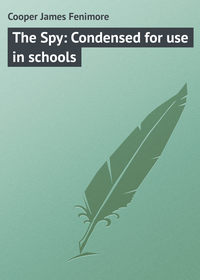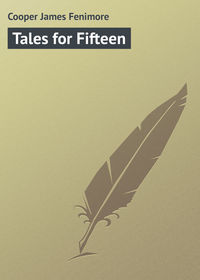
Полная версия
The Pilot: A Tale of the Sea
“Ay, I have seen him that is a true man, and him that is not,” replied Barnstable, bitterly; “you have the boy with you, Griffith – ask him what his young eyes have seen.”
“Shall I!” cried the young midshipman, laughing; “then I have seen a little clipper, in disguise, out sail an old man-of-war’s man in a hard chase, and I have seen a straggling rover in long-togs as much like my cousin – –”
“Peace, gabbler!” exclaimed Barnstable in a voice of thunder; “would you detain the boats with your silly nonsense at a time like this? Away into the barge, sir, and if you find him willing to hear, tell Mr. Griffith what your foolish conjectures amount to, at your leisure.”
The boy stepped lightly from the whale-boat to the barge, whither the pilot had already preceded him, and, as he sunk, with a mortified air, by the side of Griffith, he said, in a low voice:
“And that won’t be long, I know, if Mr. Griffith thinks and feels on the coast of England as he thought and felt at home.”
A silent pressure of his hand was the only reply that the young lieutenant made, before he paid the parting compliments to Barnstable, and directed his men to pull for their ship.
The boats were separating, and the plash of the oars was already heard, when the voice of the pilot was for the first time raised in earnest.
“Hold!” he cried; “hold water, I bid ye!”
The men ceased their efforts at the commanding tones of his voice, and turning toward the whale-boat, he continued:
“You will get your schooner under way immediately, Captain Barnstable, and sweep into the offing with as little delay as possible. Keep the ship well open from the northern headland, and as you pass us, come within hail.”
“This is a clean chart and plain sailing, Mr. Pilot,” returned Barnstable; “but who is to justify my moving without orders, to Captain Munson? I have it in black and white, to run the Ariel into this feather-bed sort of a place, and I must at least have it by signal or word of mouth from my betters, before my cutwater curls another wave. The road may be as hard to find going out as it was coming in – and then I had daylight as well as your written directions to steer by.”
“Would you lie there to perish on such a night?” said the pilot, sternly. “Two hours hence, this heavy swell will break where your vessel now rides so quietly.”
“There we think exactly alike; but if I get drowned now, I am drowned according to orders; whereas, if l knock a plank out of the schooner’s bottom, by following your directions, ‘twill be a hole to let in mutiny, as well as sea-water. How do I know but the old man wants another pilot or two.”
“That’s philosophy,” muttered the cockswain of the whaleboat, in a voice that was audible: “but it’s a hard strain on a man’s conscience to hold on in such an anchorage!”
“Then keep your anchor down, and follow it to the bottom,” said the pilot to himself; “it’s worse to contend with a fool than a gale of wind; but if – –”
“No, no, sir – no fool neither,” interrupted Griffith. “Barnstable does not deserve that epithet, though he certainly carries the point of duty to the extreme. Heave up at once, Mr. Barnstable, and get out of this bay as fast as possible.”
“Ah! you don’t give the order with half the pleasure with which I shall execute it; pull away, boys – the Ariel shall never lay her bones in such a hard bed, if l can help it.”
As the commander of the schooner uttered these words with a cheering voice, his men spontaneously shouted, and the whale-boat darted away from her companion, and was soon lost in the gloomy shadows cast from the cliffs.
In the mean time, the oarsmen of the barge were not idle, but by strenuous efforts they forced the heavy boat rapidly through the water, and in a few minutes she ran alongside of the frigate. During this period the pilot, in a voice which had lost all the startling fierceness and authority it had manifested in his short dialogue with Barnstable, requested Griffith to repeat to him, slowly, the names of the officers that belonged to his ship. When the young lieutenant had complied with this request, he observed to his companion:
“All good men and true, Mr. Pilot; and though this business in which you are just now engaged may be hazardous to an Englishman, there are none with us who will betray you. We need your services, and as we expect good faith from you, so shall we offer it to you in exchange.”
“And how know you that I need its exercise?” asked the pilot, in a manner that denoted a cold indifference to the subject.
“Why, though you talk pretty good English, for a native,” returned Griffith, “yet you have a small bur-r-r in your mouth that would prick the tongue of a man who was born on the other side of the Atlantic.”
“It is but of little moment where a man is born, or how he speaks,” returned the pilot, coldly, “so that he does his duty bravely and in good faith.”
It was perhaps fortunate for the harmony of this dialogue, that the gloom, which had now increased to positive darkness, completely concealed the look of scornful irony that crossed the handsome features of the young sailor, as he replied: “True, true, so that he does his duty, as you say, in good faith. But, as Barnstable observed, you must know your road well to travel among these shoals on such a night as this. Know you what water we draw?”
“Tis a frigate’s draught, and I shall endeavor to keep you in four fathoms; less than that would be dangerous.”
“She’s a sweet boat!” said Griffith, “and minds her helm as a marine watches the eye of his sergeant at a drill; but you must give her room in stays, for she fore-reaches, as if she would put out the wind’s eye.”
The pilot attended, with a practised ear, to this description of the qualities of the ship that he was about to attempt extricating from an extremely dangerous situation. Not a syllable was lost on him; and when Griffith had ended, he remarked, with the singular coldness that pervaded his manner:
“That is both a good and a bad quality in a narrow channel. I fear it will be the latter to-night, when we shall require to have the ship in leading-strings.”
“I suppose we must feel our way with the lead?” said Griffith.
“We shall need both eyes and leads,” returned the pilot, recurring insensibly to his soliloquizing tone of voice. “I have been both in and out in darker nights than this, though never with a heavier draught than a half-two.”
“Then, by heaven, you are not fit to handle that ship among these rocks and breakers!” exclaimed Griffith; “your men of a light draught never know their water; ‘tis the deep keel only that finds a channel; – pilot! pilot! beware how you trifle with us ignorantly; for ‘tis a dangerous experiment to play at hazards with an enemy.”
“Young man, you know not what you threaten, nor whom,” said the pilot sternly, though his quiet manner still remained undisturbed; “you forget that you have a superior here, and that I have none.”
“That shall be as you discharge your duty,” said Griffith; “for if – –”
“Peace!” interrupted the pilot; “we approach the ship, let us enter in harmony.”
He threw himself back on the cushions when he had said this; and Griffith, though filled with the apprehensions of suffering, either by great ignorance or treachery on the part of his companion, smothered his feelings so far as to be silent, and they ascended the side of the vessel in apparent cordiality.
The frigate was already riding on lengthened seas, that rolled in from the ocean at each successive moment with increasing violence, though her topsails still hung supinely from her yards; the air, which continued to breathe occasionally from the land, being unable to shake the heavy canvas of which they were composed.
The only sounds that were audible, when Griffith and the pilot had ascended to the gangway of the frigate, were produced by the sullen dashing of the sea against the massive bows of the ship, and the shrill whistle of the boatswain’s mate as he recalled the side-boys, who were placed on either side of the gangway to do honor to the entrance of the first lieutenant and his companion.
But though such a profound silence reigned among the hundreds who inhabited the huge fabric, the light produced by a dozen battle- lanterns, that were arranged in different parts of the decks, served not only to exhibit faintly the persons of the crew, but the mingled feeling of curiosity and care that dwelt on most of their countenances.
Large groups of men were collected in the gangways, around the mainmast, and on the booms of the vessel, whose faces were distinctly visible, while numerous figures, lying along the lower yards or bending out of the tops, might be dimly traced in the background, all of whom expressed by their attitudes the interest they took in the arrival of the boat.
Though such crowds were collected in other parts of the vessel, the quarter-deck was occupied only by the officers, who were disposed according to their several ranks, and were equally silent and attentive as the remainder of the crew. In front stood a small collection of young men, who, by their similarity of dress, were the equals and companions of Griffith, though his juniors in rank. On the opposite side of the vessel was a larger assemblage of youths, who claimed Mr. Merry as their fellow. Around the capstan three or four figures were standing, one of whom wore a coat of blue, with the scarlet facings of a soldier, and another the black vestments of the ship’s chaplain. Behind these, and nearer the passage to the cabin from which he had just ascended, stood the tall, erect form of the commander of the vessel.
After a brief salutation between Griffith and the junior officers, the former advanced, followed slowly by the pilot, to the place where he was expected by his veteran commander. The young man removed his hat entirely, as he bowed with a little more than his usual ceremony, and said:
“We have succeeded, sir, though not without more difficulty and delay than were anticipated.”
“But you have not brought off the pilot,” said the captain, “and without him, all our risk and trouble have been in vain.”
“He is here,”” said Griffith, stepping aside, and extending his arm towards the man that stood behind him, wrapped to the chin in his coarse pea-jacket, and his face shadowed by the falling rims of a large hat, that had seen much and hard service.
“This!” exclaimed the captain; “then there is a sad mistake – this is not the man I would have, seen, nor can another supply his place.”
“I know not whom you expected, Captain Munson,” said the stranger, in a low, quiet voice; “but if you have not forgot ten the day when a very different flag from that emblem of tyranny that now hangs over yon taffrail was first spread to the wind, you may remember the hand that raised it,”
“Bring here the light!” exclaimed the commander, hastily.
When the lantern was extended towards the pilot, and the glare fell strong on his features, Captain Munson started, as he beheld the calm blue eye that met his gaze, and the composed but pallid countenance of the other. Involuntarily raising his hat, and baring his silver locks, the veteran cried:
“It is he! though so changed – –”
“That his enemies did not know him,” interrupted the pilot, quickly; then touching the other by the arm as he led him aside, he continued, in a lower tone, “neither must his friends, until the proper hour shall arrive.”
Griffith had fallen back to answer the eager questions of his messmates, and no part of this short dialogue was overheard by the officers, though it was soon perceived that their commander had discovered his error, and was satisfied that the proper man had been brought on board his vessel. For many minutes the two continued to pace a part of the quarter-deck, by themselves, engaged in deep and earnest discourse.
As Griffith had but little to communicate, the curiosity of his listeners was soon appeased, and all eyes were directed toward that mysterious guide, who was to conduct them from a situation already surrounded by perils, which each moment not only magnified in appearance, but increased in reality.
Chapter IV
“Behold the threaden sails,Borne with the invisible and creeping winds,Draw the huge bottoms through the furrowed sea,Breasting the lofty surge.”Shakespeare.It has been already explained to the reader, that there were threatening symptoms in the appearance of the weather to create serious forebodings of evil in the breast of a seaman. When removed from the shadows of the cliffs, the night was not so dark but objects could be discerned at some little distance, and in the eastern horizon there was a streak of fearful light impending over the gloomy waters, in which the swelling outline formed by the rising waves was becoming each moment more distinct, and, consequently, more alarming. Several dark clouds overhung the vessel, whose towering masts apparently propped the black vapor, while a few stars were seen twinkling, with a sickly flame, in the streak of clear sky that skirted the ocean. Still, light currents of air occasionally swept across the bay, bringing with them the fresh odor from the shore, but their flitting irregularity too surely foretold them to be the expiring breath of the land breeze. The roaring of the surf, as it rolled on the margin of the bay, produced a dull, monotonous sound, that was only Interrupted at times by a hollow bellowing, as a larger wave than usual broke violently against some cavity in the rock. Everything, in short, united to render the scene gloomy and portentous, without creating instant terror, for the ship rose easily on the long billows, without even straightening the heavy cable that held her to her anchor.
The higher officers were collected around the capstan, engaged in earnest discourse about their situation and prospects, while some of the oldest and most favored seamen would extend their short walk to the hallowed precincts of the quarterdeck, to catch, with greedy ears, the opinions that fell from their superiors. Numberless were the uneasy glances that were thrown from both officers and men at their commander and the pilot, who still continued their secret communion in a distant part of the vessel. Once, an ungovernable curiosity, or the heedlessness of his years, led one of the youthful midshipmen near them; but a stern rebuke from his captain sent the boy, abashed and cowering, to hide his mortification among his fellows. This reprimand was received by the elder officers as an intimation that the consultation which they beheld was to be strictly inviolate; and, though it by no means suppressed the repeated expressions of their impatience, it effectually prevented an interruption to the communications, which all, however, thought were unreasonably protracted for the occasion.
“This is no time to be talking over bearings and distances,” observed the officer next in rank to Griffith; “but we should call the hands up, and try to kedge her off while the sea will suffer a boat to live.”
“’Twould be a tedious and bootless job to attempt warping a ship for miles against a head-beating sea,” returned the first lieutenant; “but the land-breeze yet flutters aloft, and if our light sails would draw, with the aid of this ebb tide we might be able to shove her from the shore.”
“Hail the tops, Griffith,” said the other, “and ask if they feel the air above; ‘twill be a hint at least to set the old man and that lubberly pilot in motion.”
Griffith laughed as he complied with the request, and when he received the customary reply to his call, he demanded in a loud voice:
“Which way have you the wind, aloft?”
“We feel a light catspaw, now and then, from the land, sir,” returned the sturdy captain of the top; “but our topsail hangs in the clewlines, sir, without winking.”
Captain Munson and his companion suspended their discourse while this question and answer were exchanged, and then resumed their dialogue as earnestly as if it had received no interruption.
“If it did wink, the hint would be lost on our betters,” said the officer of the marines, whose ignorance of seamanship added greatly to his perception of the danger, but who, from pure idleness, made more jokes than any other man in the ship. “That pilot would not receive a delicate intimation through his ears, Mr. Griffith; suppose you try him by the nose.”
“Faith, there was a flash of gunpowder between us in the barge,” returned the first lieutenant, “and he does not seem a man to stomach such hints as you advise. Although he looks so meek and quiet, I doubt whether he has paid much attention to the book of Job.”
“Why should he?” exclaimed the chaplain, whose apprehensions at least equaled those of the marine, and with a much more disheartening effect; “I am sure it would have been a great waste of time: there are so many charts of the coast, and books on the navigation of these seas, for him to study, that I sincerely hope he has been much better employed.”
A loud laugh was created at this speech among the listeners, and it apparently produced the effect that was so long anxiously desired, by putting an end to the mysterious conference between their captain and the pilot. As the former came forward towards his expecting crew, he said, is the composed, steady manner that formed the principal trait in his character:
“Get the anchor, Mr. Griffith, and make sail on the ship; the hour has arrived when we must be moving.”
The cheerful “Ay! ay! sir!” of the young lieutenant was hardly uttered, before the cries of half a dozen midshipmen were heard summoning the boatswain and his mates to their duty.
There was a general movement in the living masses that clustered around the mainmast, on the booms, and in the gangways, though their habits of discipline held the crew a moment longer in suspense. The silence was first broken by the sound of the boatswain’s whistle, followed by the hoarse cry of“ All hands, up anchor, ahoy!” – the former rising on the night air, from its first low mellow notes to a piercing shrillness that gradually died away on the waters; and the latter bellowing through every cranny of the ship, like the hollow murmurs of distant thunder.
The change produced by the customary summons was magical. Human beings sprang out from between the guns, rushed up the hatches, threw themselves with careless activity from the booms, and gathered from every quarter so rapidly, that in an instant the deck of the frigate was alive with men. The profound silence, that had hitherto been only interrupted by the low dialogue of the officers, was now changed for the stern orders of the lieutenants, mingled with the shriller cries of the midshipmen, and the hoarse bawling of the boatswain’s crew, rising above the tumult of preparation and general bustle.
The captain and the pilot alone remained passive, in this scene of general exertion; for apprehension had even stimulated that class of officers which is called “idlers” to unusual activity, though frequently reminded by their more experienced messmates that, instead of aiding, they retarded the duty of the vessel. The bustle, however, gradually ceased, and in a few minutes the same silence pervaded the ship as before.
“We are brought-to, sir,” said Griffith, who stood overlooking the scene, holding in one hand a short speaking, trumpet, and grasping with the other one of the shrouds of the ship, to steady himself in the position he had taken on a gun.
“Heave round, sir,” was the calm reply.
“Heave round!” repeated Griffith, aloud.
“Heave round!” echoed a dozen eager voices at once, and the lively strains of a fife struck up a brisk air, to enliven the labor. The capstan was instantly set in motion, and the mea sured tread of the seamen was heard, as they stamped the deck in the circle of their march. For a few minutes no other sounds were heard, if we except the voice of an officer, occasionally cheering the sailors, when it was announced that they “were short;” or, in other words, that the ship was nearly over her anchor.
“Heave and pull,” cried Griffith; when the quivering notes of the whistle were again succeeded by a general stillness in the vessel.
“What is to be done now, sir?” continued the lieutenant; “shall we trip the anchor? There seems not a breath of air; and as the tide runs slack, I doubt whether the sea do not heave the ship ashore.”
There was so much obvious truth in this conjecture, that all eyes turned from the light and animation afforded by the decks of the frigate, to look abroad on the waters, in a vain desire to pierce the darkness, as if to read the fate of their apparently devoted ship from the aspect of nature.
“I leave all to the pilot,” said the captain, after he had stood a short time by the side of Griffith, anxiously studying the heavens and the ocean. “What say you, Mr. Gray?”
The man who was thus first addressed by name was leaning over the bulwarks, with his eyes bent in the same direction as the others; but as he answered he turned his face towards the speaker, and the light from the deck fell full upon his quiet features, which exhibited a calmness bordering on the supernatural, considering his station and responsibility.
“There is much to fear from this heavy ground-swell,” he said, in the same unmoved tones as before; “but there is certain destruction to us, if the gale that is brewing in the east finds us waiting its fury in this wild anchorage. All the hemp that ever was spun into cordage would not hold a ship an hour, chafing on these rocks, with a northeaster pouring its fury on her. If the powers of man can compass it, gentlemen, we must get an offing, and that speedily.”
“You say no more, sir, than the youngest boy in the ship can see for himself,” said Griffith – “ha! here comes the schooner!”
The dashing of the long sweeps in the water was now plainly audible, and the little Ariel was seen through the gloom, moving heavily under their feeble impulse. As she passed slowly under the stern of the frigate, the cheerful voice of Barnstable was first heard, opening the communications between them.
“Here’s a night for spectacles, Captain Munson!” he cried; “but I thought I heard your fife, sir. I trust in God, you do not mean to ride it out here till morning?”
“I like the berth as little as yourself, Mr. Barnstable,” returned the veteran seaman, in his calm manner, in which anxiety was, however, beginning to grow evident. “We are short; but are afraid to let go our hold of the bottom, lest the sea cast us ashore. How make you out the wind?”
“Wind!” echoed the other; “there is not enough to blow a lady’s curl aside. If you wait, sir, till the land-breeze fills your sails, you will wait another moon. I believe I’ve got my eggshell out of that nest of gray-caps; but how it has been done in the dark, a better man than myself must explain.”
“Take your directions from the pilot, Mr. Barnstable,” returned his commanding officer, “and follow them strictly and to the letter.”
A deathlike silence, in both vessels, succeeded this order; for all seemed to listen eagerly to catch the words that fell from the man on whom, even the boys now felt, depended their only hopes for safety. A short time was suffered to elapse, before his voice was heard, in the same low but distinct tones as before:
“Your sweeps will soon be of no service to you,” he said, “against the sea that begins to heave in; but your light sails will help them to get you out. So long as you can head east-and-by-north, you are doing well, and you can stand on till you open the light from that northern headland, when you can heave to and fire a gun; but if, as I dread, you are struck aback before you open the light, you may trust to your lead on the larboard tack; but beware, with your head to the southward, for no lead will serve you there.”
“I can walk over the same ground on one tack as on the other,” said Barnstable, “and make both legs of a length.”
“It will not do,” returned the pilot. “If you fall off a point to starboard from east-and-by-north, in going large, you will find both rocks and points of shoals to bring you up; and beware, as I tell you, of the starboard tack.”
“And how shall I find my way? you will let me trust to neither time, lead, nor log.”
“You must trust to a quick eye and a ready hand. The breakers only will show you the dangers, when you are not able to make out the bearings of the land. Tack in season, sir, and don’t spare the lead when you head to port.”









